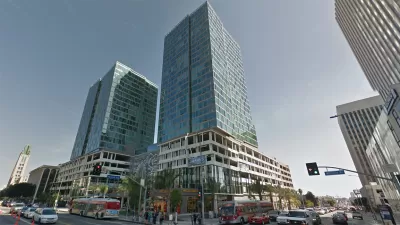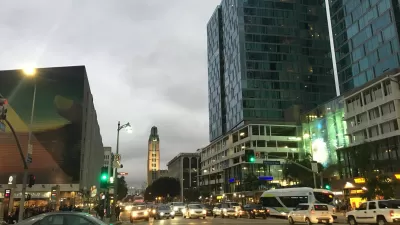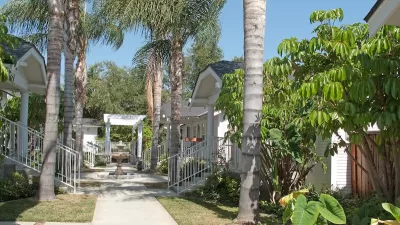Above-grade parking garages, also called parking podiums, have become a standard typology across Los Angeles. From Koreatown to Downtown, new residential buildings are separated from the street by several floors of space devoted to parking.

"Downtown Los Angeles has found itself in the midst of a building spree that has augmented its long stagnant skyline," according to Steven Sharp. "This barrage of ground-up construction has also highlighted some of the weaknesses in the City's building code, particularly in terms of how new buildings are expected to address the public realm."
More specifically, those weaknesses have allowed for the proliferation of parking podiums (i.e., several stories of stacked parking located between the street and the residential units above) as a common feature of the city's new residential towers. Here, Sharp explains the visual blight and safety issues presented parking podiums:
By forcing habitable uses farther away from the ground plane, podiums are seen as reducing "eyes on the street" and therefore impacting the vibrancy and economic health of the surrounding neighborhood.
The Los Angeles Department of City Planning (LADCP) is preparing a response to the proliferation of parking podiums, acknowledging that the city's zoning code is at least partly responsible for the way parking garages are built in the city. LADCP staff recently released an advisory notice that calls attention to the existing regulations regarding parking.
Sharp digs into the advisory notice, calling attention to potential next steps toward limiting additional construction of parking podiums.
FULL STORY: Planning Department Tackles Parking Podiums

Planetizen Federal Action Tracker
A weekly monitor of how Trump’s orders and actions are impacting planners and planning in America.

Maui's Vacation Rental Debate Turns Ugly
Verbal attacks, misinformation campaigns and fistfights plague a high-stakes debate to convert thousands of vacation rentals into long-term housing.

Restaurant Patios Were a Pandemic Win — Why Were They so Hard to Keep?
Social distancing requirements and changes in travel patterns prompted cities to pilot new uses for street and sidewalk space. Then it got complicated.

In California Battle of Housing vs. Environment, Housing Just Won
A new state law significantly limits the power of CEQA, an environmental review law that served as a powerful tool for blocking new development.

Boulder Eliminates Parking Minimums Citywide
Officials estimate the cost of building a single underground parking space at up to $100,000.

Orange County, Florida Adopts Largest US “Sprawl Repair” Code
The ‘Orange Code’ seeks to rectify decades of sprawl-inducing, car-oriented development.
Urban Design for Planners 1: Software Tools
This six-course series explores essential urban design concepts using open source software and equips planners with the tools they need to participate fully in the urban design process.
Planning for Universal Design
Learn the tools for implementing Universal Design in planning regulations.
Heyer Gruel & Associates PA
JM Goldson LLC
Custer County Colorado
City of Camden Redevelopment Agency
City of Astoria
Transportation Research & Education Center (TREC) at Portland State University
Jefferson Parish Government
Camden Redevelopment Agency
City of Claremont





























